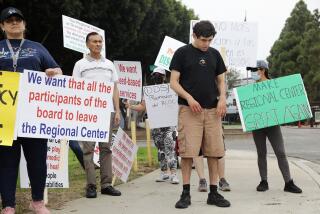Autism screening test could be offered to 1-year-olds
Autism treatment works best the earlier a child is diagnosed and begins therapy. A new screening test for babies at their 1-year-old check-up may be reliable enough to be used in pediatricians’ offices around the world, said the authors of a review of the method.
The screening test was performed on 10,479 1-year-olds in San Diego. The babies were the patients of 137 different pediatricians. Parents or guardians gave their permission for the babies to be screened.
Using a checklist that took about five minutes to complete, doctors asked questions about the child’s use of eye contact, sounds, words, gestures, object recognition and other forms of communication. The children who failed the screening were referred to the UC San Diego Autism Center for Excellence for follow-up evaluations every six months until age 3. Of the initial 346 referrals, 184 infants were seen for at least two testing sessions.
To date, 32 of the children who failed the initial screening have received a provisional or confirmed diagnosis of autism spectrum disorder while 56 children have been diagnosed with language delay, nine children with developmental delay and 36 with other types of developmental delay. Overall, the screening had a positive predictive value of 75%.
Of the children who were eventually referred for treatment, the therapies began at age 19 months, on average, which is far earlier than the typical child diagnosed with autism.
“Despite these hurdles and unknowns, this screening program is promising because it can be implemented at virtually no cost to pediatric practices and is easily translatable into clinical practice,” the authors wrote.
The potential benefits of the test may well outweigh the false-positive rate of 25%, they said.
“There is extensive evidence that early therapy can have a positive impact on the developing brain,” the lead author of the study, Karen Pierce, assistant professor of neuroscience at UC San Diego said in a news release. “The opportunity to diagnose and thus begin treatment for autism around a child’s first birthday has enormous potential to change outcomes for children affected with the disorder.”
The study, published online Thursday in the Journal of Pediatrics, did not determine how many of the children who passed the screening test went on to receive a diagnosis of autism or developmental delay. Moreover, some of the parents of babies who failed the initial screening test did not choose to proceed with additional screening. Finally, the screening test would not be expected to identify the approximately 25% of children who are diagnosed with a different pattern of autism in which they develop normally in the first year but begin to regress some time after their first birthday.
Related: Autism treatments often lack solid evidence of effectiveness, study finds
Return to Booster Shots blog.
More to Read
Sign up for our L.A. Times Plants newsletter
At the start of each month, get a roundup of upcoming plant-related activities and events in Southern California, along with links to tips and articles you may have missed.
You may occasionally receive promotional content from the Los Angeles Times.






